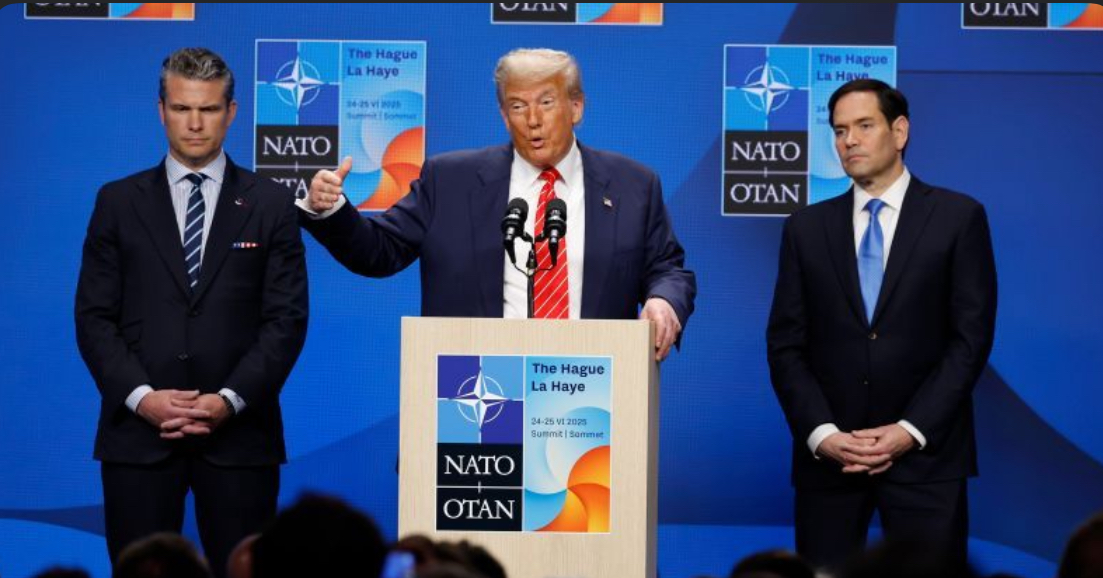NFL
Fact-Checking Trump’s NATO Claims: Missteps on Ukraine War, U.S. Inflation, and Alleged Iranian Nuclear Site Destruction

Fact-Checking Trump’s NATO Summit Claims: Falsehoods on Ukraine, Inflation, ISIS, and Iran Nuclear Strikes
Amsterdam, Netherlands – June 25, 2025 – During a high-profile news conference at the NATO summit in the Netherlands on Wednesday, President Donald Trump made a series of bold claims that have since been scrutinized for their accuracy. Addressing global leaders and the press, Trump spoke on topics ranging from the ongoing war in Ukraine to U.S. inflation, the fight against the ISIS terror group, and alleged U.S. military strikes on Iranian nuclear sites. However, a fact-check of his statements reveals multiple inaccuracies and unproven assertions, raising concerns about the credibility of his remarks on the international stage.
False Claims on the Ukraine War
President Trump asserted during the news conference that the war in Ukraine was “nearly over” and that his administration’s policies had directly led to a weakened Russian military presence. He claimed, “We’ve got Ukraine winning big, and Russia’s on its last legs, thanks to our support.” However, this portrayal is misleading. The conflict in Ukraine remains a protracted and complex struggle, with no clear resolution in sight as of June 2025. According to reports from the U.S. Department of Defense and NATO allies, while Ukraine has made significant gains with Western support, Russia continues to maintain substantial military resources and territorial control in parts of eastern Ukraine. Trump’s claim of a near-end to the conflict oversimplifies the situation and lacks evidence from current battlefield assessments.
Misleading Statements on U.S. Inflation
Trump also took credit for what he described as a “tremendous turnaround” in U.S. inflation, stating, “We’ve brought inflation down to historic lows, better than any administration in decades.” This assertion is demonstrably false. Data from the U.S. Bureau of Labor Statistics indicates that inflation in 2025 remains a challenge, with consumer price indices showing persistent pressures in sectors like housing, energy, and food. While inflation has moderated from its 2022 peak, it remains above the Federal Reserve’s 2% target, and economists attribute recent stabilization to global market trends and monetary policy adjustments rather than specific actions by Trump’s administration. His claim of achieving “historic lows” is not supported by economic data.
Exaggerations on the Fight Against ISIS
On the topic of the Islamic State (ISIS), Trump reiterated his oft-repeated claim that his first term “completely destroyed” the terror group, adding that “ISIS is no longer a threat because of what we did.” While it is true that the U.S.-led coalition made significant progress in dismantling ISIS’s territorial caliphate in Syria and Iraq by 2019, experts note that the group remains active in various regions. According to a 2025 report from the U.S. Central Command, ISIS continues to conduct insurgent operations and recruit in parts of the Middle East, Africa, and South Asia. Trump’s assertion that ISIS is no longer a threat ignores the group’s ongoing activities and the need for continued counterterrorism efforts.
Unproven Claims of Iranian Nuclear Site “Obliteration”
Perhaps the most striking of Trump’s claims was his assertion that recent U.S. military strikes had “obliterated” Iranian nuclear facilities over the weekend, rendering Iran’s nuclear program “dead in the water.” This statement, however, lacks any corroborating evidence. No official reports from the U.S. Department of Defense, NATO, or international monitoring agencies, such as the International Atomic Energy Agency (IAEA), confirm any such strikes occurring in June 2025. Iran’s government has also not reported any attacks on its nuclear infrastructure during this period. Trump’s claim appears to be an unverified exaggeration, possibly intended to project strength but risking diplomatic fallout with allies and adversaries alike.
Context and Implications
Trump’s remarks come at a critical time for NATO, as the alliance grapples with ongoing challenges, including supporting Ukraine against Russia, addressing global terrorism, and navigating tensions with Iran. His statements, delivered in the presence of NATO leaders, were intended to underscore U.S. leadership but have instead drawn scrutiny for their inaccuracies. Critics argue that such falsehoods could undermine trust among allies and embolden adversaries, particularly when unverified claims about military actions risk escalating tensions in volatile regions like the Middle East.
Fact-checking organizations and international observers have called for greater accountability in public statements from world leaders, particularly at high-stakes forums like the NATO summit. Trump’s history of making exaggerated or false claims has been well-documented, but the global stage amplifies the consequences of such rhetoric. For instance, his unproven assertion about Iranian nuclear sites could complicate ongoing diplomatic efforts to address Iran’s nuclear ambitions, while his misleading claims about Ukraine and ISIS may misinform the public and policymakers about the true state of these conflicts.
Conclusion
President Trump’s Wednesday news conference at the NATO summit in the Netherlands was marked by a series of false and misleading claims that have sparked debate and concern. From overstating progress in Ukraine to exaggerating victories over ISIS and inflation, and making unverified assertions about Iranian nuclear sites, Trump’s remarks have been met with skepticism and fact-checking. As the NATO summit continues, the international community will likely keep a close eye on how such statements shape perceptions of U.S. leadership and policy. For now, Trump’s claims serve as a reminder of the importance of grounding high-stakes rhetoric in verifiable facts.
LISPRINCE












